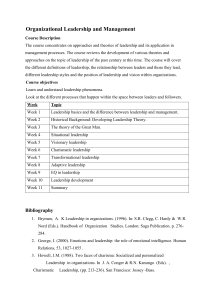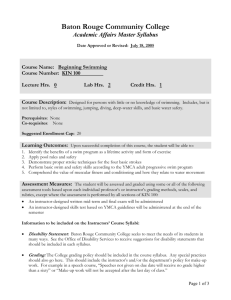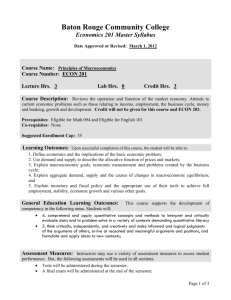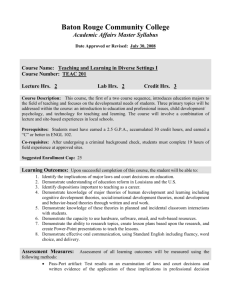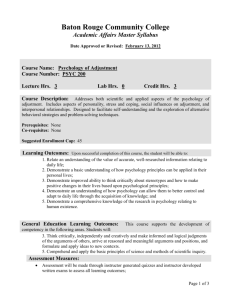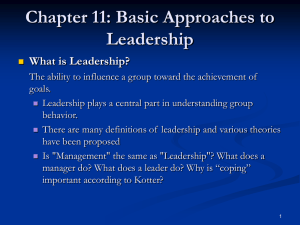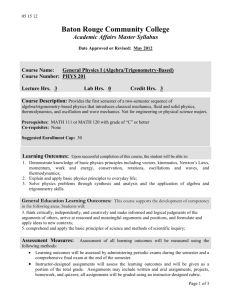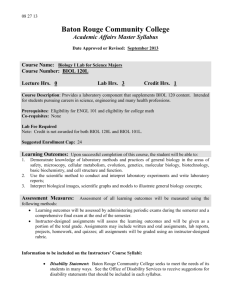MANG 226 - Baton Rouge Community College
advertisement
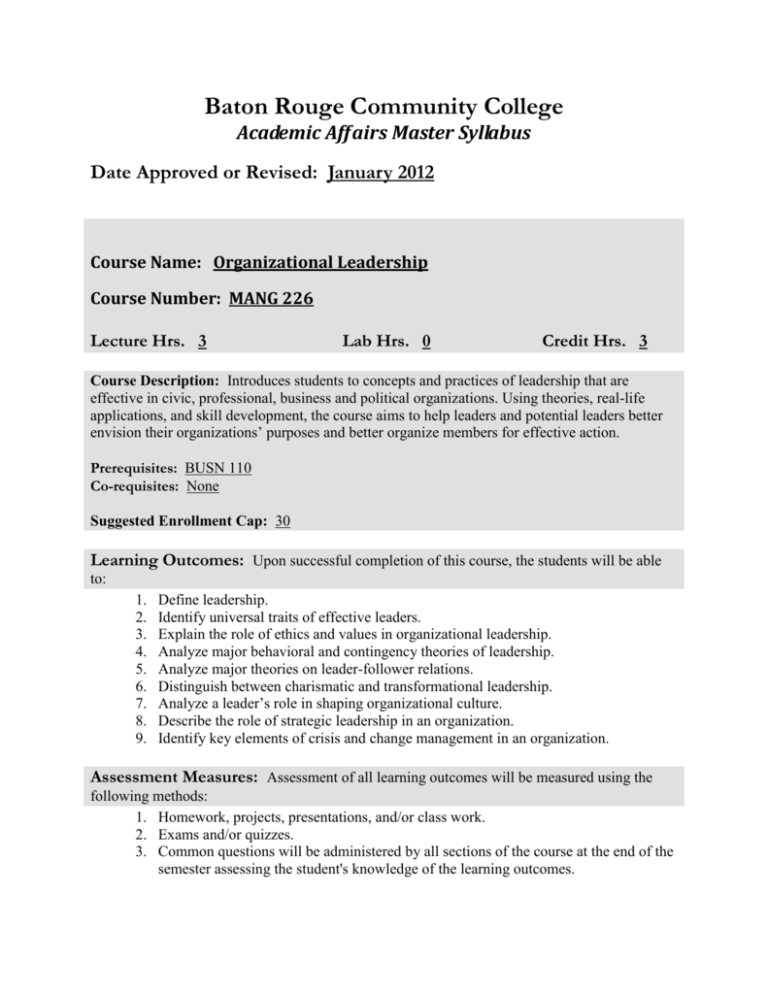
Baton Rouge Community College Academic Affairs Master Syllabus Date Approved or Revised: January 2012 Course Name: Organizational Leadership Course Number: MANG 226 Lecture Hrs. 3 Lab Hrs. 0 Credit Hrs. 3 Course Description: Introduces students to concepts and practices of leadership that are effective in civic, professional, business and political organizations. Using theories, real-life applications, and skill development, the course aims to help leaders and potential leaders better envision their organizations’ purposes and better organize members for effective action. Prerequisites: BUSN 110 Co-requisites: None Suggested Enrollment Cap: 30 Learning Outcomes: Upon successful completion of this course, the students will be able to: 1. 2. 3. 4. 5. 6. 7. 8. 9. Define leadership. Identify universal traits of effective leaders. Explain the role of ethics and values in organizational leadership. Analyze major behavioral and contingency theories of leadership. Analyze major theories on leader-follower relations. Distinguish between charismatic and transformational leadership. Analyze a leader’s role in shaping organizational culture. Describe the role of strategic leadership in an organization. Identify key elements of crisis and change management in an organization. Assessment Measures: Assessment of all learning outcomes will be measured using the following methods: 1. Homework, projects, presentations, and/or class work. 2. Exams and/or quizzes. 3. Common questions will be administered by all sections of the course at the end of the semester assessing the student's knowledge of the learning outcomes. 4. The set of common questions will cover all of the learning outcomes. If the set of common questions is included as part of the final exam, this portion of the exam may, at the instructor’s option, be used or not in determining the grade on the final exam. Information to be included on the Instructors’ Course Syllabi: Disability Statement: Baton Rouge Community College seeks to meet the needs of its students in many ways. See the Office of Disability Services to receive suggestions for disability statements that should be included in each syllabus. Grading: The College grading policy should be included in the course syllabus. Any special practices should also go here. This should include the instructor’s and/or the department’s policy for make-up work. For example in a speech course, “Speeches not given on due date will receive no grade higher than a sixty” or “Make-up work will not be accepted after the last day of class.” Attendance Policy: Include the overall attendance policy of the college. Instructors may want to add additional information in individual syllabi to meet the needs of their courses. General Policies: Instructors’ policy on the use of things such as beepers and cell phones and/or hand held programmable calculators should be covered in this section. Cheating and Plagiarism: This must be included in all syllabi and should include the penalties for incidents in a given class. Students should have a clear idea of what constitutes cheating in a given course. Safety Concerns: In some programs this may be a major issue. For example, “No student will be allowed in the safety lab without safety glasses.” General statements such as, “Items that may be harmful to one’s self or others should not be brought to class.” Library/ Learning Resources: Since the development of the total person is part of our mission, assignments in the library and/or the Learning Resources Center should be included to assist students in enhancing skills and in using resources. Students should be encouraged to use the library for reading enjoyment as part of lifelong learning. Expanded Course Outline: I. Leadership a. What is leadership b. Major leadership theory paradigms II. Leadership Traits a. Personality traits and leadership b. Personality profile of effective leaders III. Ethical Leadership a. Values, ethics, morals b. Role of ethics and values in organizational leadership c. Guide to ethical behavior IV. Leadership Behavior a. Leadership Styles b. Leadership Grid c. Leadership and Motivation Theories V. Contingency Leadership Theories a. Contingency leadership theories and models b. Leadership continuum theory and model c. Path-Goal Leadership Theory and Model d. Normative Leadership Theory and Model VI. Leader-Follower Relations a. Dyadic Theory b. Leader-Member Exchange Theory c. Followership VII. Charismatic and Transformational Leadership a. Charismatic leadership b. Transformational Leadership c. Servant Leadership VIII. Leadership of Culture and Diversity a. Organizational Culture and Leadership b. Understanding Global Cultural Difference IX. Strategic Leadership and Managing Change a. Strategic Leadership b. Crisis Leadership c. Leading Change
